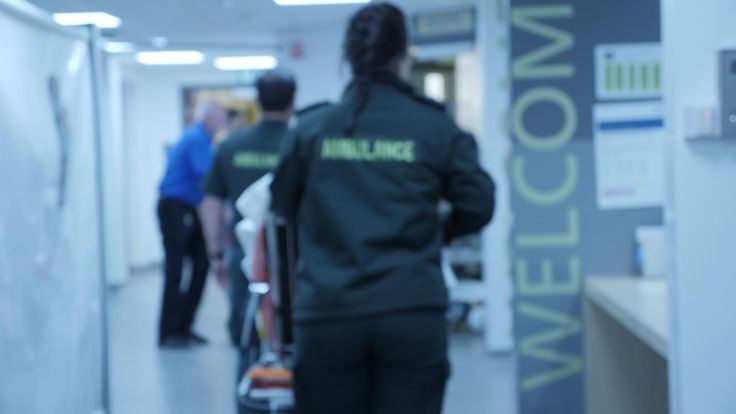Sky Views: Immigration plans will damage the NHS
Paul Kelso, health correspondent
You are far more likely to be treated in the NHS by an immigrant than you are to be stuck in a queue behind one.
Almost 13% of NHS England’s 1.2m staff come from overseas, 63,000 (5.6%) from the European Union, with a further 81,000 from non-EU countries (7.1%).
British and Irish nationals however account for all but 11% of health consumption, of which EU nationals consume a little over 2%.
These are points worth remembering this week if, as trailed, the government announces its plans for post-Brexit immigration.
According to the Telegraph, Home Secretary Sajid Javid will announce skilled EU migrants will have to earn at least £30,000 before they are allowed to come to Britain.
The Sunday Times says the measure is part of a plan to cut the number of EU nationals by 80%.
Given the government’s parlous record on immigration targets this may be less a genuine goal than a message to the Brexit backbenches, “a bit of red meat” in the words of a Telegraph source.
The politics might be appealing for an embattled prime minister and her aspiring successor at the Home Office but the policy could be disastrous for the NHS.
A scrap to sate the appetites of those who campaigned to leave on an NHS myth could fundamentally undermine its ability to function.
Currently skilled non-EU nationals have to earn more than £30,000 and, until the summer, were required to get a Tier 2 visa, which until the summer were capped at 2,000 a month, with only some healthcare workers exempt.
The cap has now been lifted for all NHS jobs, but Mr Javid’s plan, informed by the Migration Advisory Committee (MAC), is for the earnings threshold to apply for EU nationals, irrespective of what visa regime replaces free movement.
One doctor Rachel Clarke, a vocal opponent of current policy, who tweets as @doctor_oxford, helpfully spelt out the impact with a list of NHS starting salaries:
“Nurse £23.0k Paramedic £23.0k Midwife £23.0k Junior doctor £27.1k Radiographer £23.0k Healthcare assistant £17.5k Physiotherapist £23.0k Dietician £23.0k Occupational therapist £23.0k. Are you actually *trying* to destroy the NHS,@sajidjavid?”
He would doubtless say not, but recruitment is already the biggest challenge the NHS faces. It runs through every corner of the service and informs every issue, and without an exemption for NHS staff this policy may make it worse.
The NHS already has vacancies for at least 100,000 nurses and doctors, and the unions, professional bodies and hospital Trusts all believe this policy is likely to make recruitment even harder.
So does the chief executive of the NHS. Earlier this year Simon Stevens said the “arbitrary” salary proposal could lose the NHS “hundreds and thousands” of workers.
It could be even worse for the social care sector, which relies on “low-skilled workers”, who according to reports will only be able to get one-year visas that have renewed annually.
The only exemption the MAC recommends is for seasonal agricultural workers, meaning Brexit Britain could have more foreign fruit pickers than care workers.
The MAC is clear that migrants have been a net benefit to the NHS.
Quite apart from the impact of those working in the NHS already, they tend to be younger, healthier and use services less than UK nationals.
“There is no doubt that EEA migrants contribute more to the health workforce than they consume in healthcare,” it concludes. “Furthermore, there is no evidence that increased migration has led to a decrease in the quality of health services in the UK.”
I spent most of last week at West Suffolk Hospital in Bury St Edmunds, a classic district general with some advantages in the jobs market. It is coping better than some with rising demand, Suffolk is a pleasant place to live without being ruinously expensive, and it scores highly in staff satisfaction surveys.
Yet even here they may not be able to open every bed this winter because they can’t staff them safely, and they already rely heavily on overseas recruitment.
The hospital is in the process of recruiting more than 150 nurses from the Philippines, and they join a sizeable Portugese contingent, including several people in senior management positions, a legacy of previous recruitment drives.
Brexit means that in future both groups will be treated the same.
Without an exemption for healthcare workers however it may be patients who pay.
There is no question that the NHS needs to do more to recruit, train and retain homegrown staff. It will set out how its long-term strategy to address recruitment, the first ever in its 70 year history, in the long-term plan that was supposed to be published this week only to be postponed.
It says almost everything we need to know about the state of politics that a policy that may harm the NHS will be published before plans to make it better.
Sky Views is a series of comment pieces by Sky News editors and correspondents, published every morning.
Previously on Sky Views: Mark Stone – Politicians must not forget Brexit’s impact on real people
Source: Read Full Article




